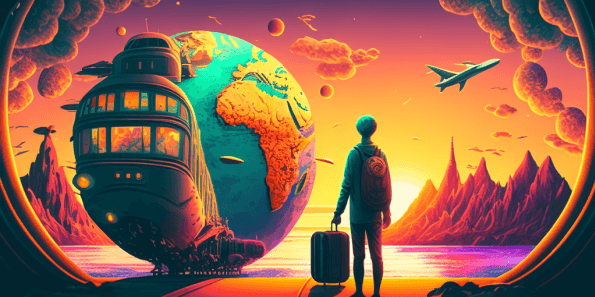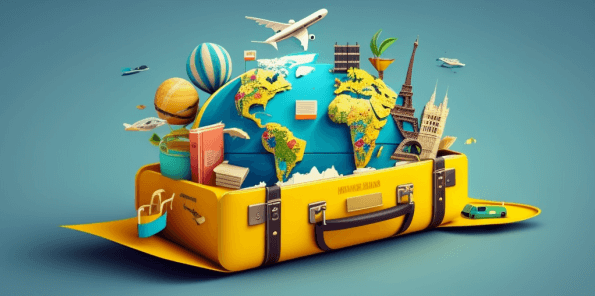If you want this guide emailed to you as an easy-to-reference PDF, sign up for our free weekly newsletter using the boxes on this page.
You’ve finally decided it’s time to take that dream trip to Japan you’ve been thinking about for years. You’re excited, but also a little overwhelmed. There’s so much to plan and figure out. That’s where ChatGPT, your AI sidekick, steps in.
First things first, you’d ask ChatGPT, “What’s the best time of year to visit Japan?”
ChatGPT would share that spring and fall are generally considered the best times due to the cherry blossoms and autumn leaves. But it also depends on what you want to do: skiing in Hokkaido, summer festivals in Kyoto, or maybe you’re into that bustling Tokyo city life.
Next, you’re pondering where to stay. “ChatGPT, suggest some neighborhoods to stay in Tokyo.”
In no time, you’ll get a rundown of different areas, like the historic Asakusa, the trendy Shibuya, or the peaceful Kichijoji.
ChatGPT can’t book a hotel for you, but it can certainly help you figure out which area suits your style.
You’re definitely a foodie, so you ask, “What food should I try in Japan?” ChatGPT reels off a list of must-tries: sushi, ramen, okonomiyaki, takoyaki, and so much more. You can practically taste them already!
You’re also wondering how to get around in Japan. Ask ChatGPT about the local transportation options. You’ll learn about the efficient train system, the iconic Shinkansen, and even the quirky-themed buses in some cities.
You’re almost ready, but you’re fretting over what to pack. “ChatGPT, what should I pack for a spring trip to Japan?” You get a detailed packing list, from light jackets for the cool evenings, to a good pair of walking shoes for all those temple visits, and even a recommendation to bring a small gift or ‘omiyage’ if you’re planning to visit a Japanese home.
With a few more back-and-forths with ChatGPT, you feel much more prepared. Your dream trip isn’t just a dream anymore, it’s a real, concrete plan. And with ChatGPT by your side, you know you can handle any other questions that pop up along the way. Bon Voyage! Or, should I say, 旅行を楽しんでください! (Enjoy your trip!)
Welcome to our ultimate guide on how to use ChatGPT to plan your next vacation
1. Discovering the ideal destination

So, you’ve got some vacation time coming up and a serious case of wanderlust, but you’re still not sure where to go. That’s where ChatGPT, your friendly AI travel advisor, comes in.
Let’s say you know you want a beach vacation, but you’re not sure which beach destination is right for you. You might ask ChatGPT,
“What are some popular beach destinations?”
It could then give you a list of options ranging from the white sands of Maldives, to the lively beaches of Rio de Janeiro, or the serene coastlines of Greece.
Suppose you’re a big foodie and you want your trip to be all about trying new cuisine. You might ask:
“Which countries are known for their food?”
ChatGPT would then share that Italy is renowned for its pasta and pizza, Thailand for its street food, France for its pastries and cheese, or Japan for its sushi and ramen.
Or maybe you’re an adventure junkie and you’re looking for some thrills.
“Where are the best places for outdoor adventures?”
It might suggest exploring the hiking trails in New Zealand, experiencing the wildlife safaris in Kenya, diving in Australia’s Great Barrier Reef, or mountain biking in the Canadian Rockies.
ChatGPT can also provide information about the local culture, customs, and languages of different places. It’s like having your very own pocket-sized travel encyclopedia!
So go ahead, ask away! ChatGPT is here to help you find your perfect travel destination.
2. ChatGPT’s Expert Picks for Hotels, Restaurants, and Cars

Let’s dive into how ChatGPT can help you suss out the best hotels, restaurants, and car rental services for your upcoming trip.
So, you’ve decided on your destination – let’s imagine it’s a trip to the vibrant city of Cape Town, South Africa. Now, it’s time to sort out the details.
Hotels
Let’s start with finding a great place to stay. You might ask:
“What are some popular areas to stay in Cape Town?”
ChatGPT could tell you about the V&A Waterfront for its bustling shopping scene, the city bowl area for its proximity to key attractions, or the scenic Camps Bay with its beachside appeal.
Maybe you’re considering a boutique hotel? Just ask:
“What are the benefits of staying in a boutique hotel?”
And ChatGPT can tell you all about the personalized service, local charm, and unique designs often associated with boutique accommodations.
Here are other examples you could use:
- “What are some luxury hotels in Paris?”
- “How can I choose a family-friendly hotel in Orlando?”
- “What are the differences between a bed and breakfast and a hotel?”
How to use ChatGPT to 10x your Instagram account in 7 steps

We teach you how to build your own super-useful prompts
View our Ebook, with a step-by-step
walkthrough to conquer Instagram using ChatGPT even if you are not tech-savvy
Restaurants
Now, let’s talk food (one of the best parts of any trip, if you ask me!). You’re curious about local cuisine and ask,
“What are some traditional South African dishes I should try?”
ChatGPT might suggest dishes like bobotie, a spiced mince dish, or bunny chow, a hollowed-out loaf of bread filled with curry.
Or maybe you ask,
“Suggest some fine dining restaurants in Cape Town”
and it could name a few like The Test Kitchen or La Colombe, known for their fusion of local and international flavors.
Here are other examples you could use:
- “What are some famous seafood restaurants in Seattle?”
- “Tell me about vegetarian cuisine in India and where I can try it.”
- “What are some Michelin-starred restaurants in San Francisco?”
[convertkit form=5204828]
Car Rental Services
Lastly, perhaps you’re considering a self-drive trip to explore the Cape’s beautiful wine regions and coastal drives. So you ask,
“What should I consider when renting a car in South Africa?”
It can provide a host of useful information like checking the car insurance policy, considering the type of vehicle for your travel needs, or tips on driving safety in South Africa.
Here are other examples you could use:
- “What are the steps to rent a car in Italy?”
- “What are the advantages and disadvantages of renting a car while traveling?”
- “What kind of driving license do I need to rent a car in the UK?”
“Where are the best places for outdoor adventures?”
Remember, while ChatGPT can provide a wealth of information and advice, it’s not able to make real-time bookings or provide current pricing yet – however, access to the internet is coming soon. We will update the guide as soon as this feature is rolled out worldwide. For now, double-check details on official websites or trusted booking platforms.
You may also like 📖
3. Discover How ChatGPT Prepares You to Embrace Local Culture

So, you’ve decided to explore the breathtaking landscapes of Thailand. The tickets are booked, the suitcase is packed, but you want to make sure you respect the local customs and blend in as much as possible. That’s where ChatGPT comes in.
Maybe you’re curious about the traditional Thai greeting, the “wai”. You could ask,
“How do I greet people in Thailand?”
It would explain that the “wai” involves a slight bow with palms pressed together in a prayer-like fashion. It’s not only a greeting but also a sign of respect.
Perhaps you’re wondering about dining etiquette. You might ask,
“What should I know about eating out in Thailand?”
ChatGPT could share some local customs like it’s common to use a fork to push food onto a spoon, and it’s polite to leave a little bit of food on your plate to show you’re satisfied.
Or let’s say you’re planning to visit some of Thailand’s beautiful temples and you’re not sure about the dress code. Ask,
“What should I wear when visiting temples in Thailand?”
It can provide tips like dressing modestly by covering your shoulders and knees, and removing your shoes before entering a temple.
You might even want to learn a few basic phrases in Thai to make your journey smoother. Just ask,
“ChatGPT, teach me some basic Thai phrases,” and you’ll soon be saying “Sawasdee” (hello) and “Khob khun” (thank you) like a local.
You may also like 📖
- How ChatGPT can help you find your next perfect getaway
- How to use ChatGPT as a Teacher in the Early Years Classroom
- How to use ChatGPT to create a yoga plan that aids weight loss
- Using ChatGPT to spark conversations for dates and couples
- How to use ChatGPT to write the best wedding speech ever
- How to use ChatGPT to create Fitness Plans that get results quick
- How to use ChatGPT to create a Budget that actually works
Digging Deeper into Local Culture
The Business person
As a business person, understanding local customs can be particularly important for successful interactions and meetings. Here are two examples of prompts you could use with ChatGPT:
“I have a business meeting in Tokyo, Japan. What are some important business etiquette rules I should be aware of?”
ChatGPT could provide you with useful insights about the importance of punctuality, the proper exchange of business cards, bowing etiquette, and the role of hierarchy in Japanese business culture.
“I’m traveling to Dubai for a business conference. What should I know about professional dress code and public behavior norms in the UAE?”
ChatGPT could explain the local customs, such as dressing conservatively, the significance of using the right hand for greetings or exchanging items, and the importance of respect for Islamic traditions and practices.
The family
Traveling with children can be a wonderful opportunity to expose them to different cultures. Here are two examples of prompts you could use with ChatGPT:
“We’re planning a family trip to Paris, France. What are some local customs and etiquette that I should teach my children?”
ChatGPT could provide you with insights such as the importance of saying “Bonjour” (Hello) and “Merci” (Thank you), the typical French dining etiquette, or how to politely navigate in public spaces.
“My family and I are traveling to Mexico City, Mexico. What should we know about local customs, especially for children?”
ChatGPT could tell you about the vibrant Mexican culture, the significance of family values, mealtime customs, or even about the fun tradition of “la mordida” during birthday celebrations.
4. Uncover Local Events with ChatGPT

So, you’re heading to the vibrant city of New York. You’ve got the must-see sights on your list: the Statue of Liberty, Times Square, Central Park. But you’re wondering, “What’s going on in the city while I’m there?” That’s where ChatGPT, your AI events concierge, comes in.
Maybe you’re a music lover and want to catch some live shows. You might ask,
“What are some famous music festivals or venues in New York?”
It could tell you about the legendary Madison Square Garden, the jazz shows at Blue Note, or the SummerStage festival in Central Park.
Perhaps you’re an art enthusiast and you want to immerse yourself in local art events. You could ask,
“What are some art events or galleries I should check out in New York?”
ChatGPT might suggest visiting the MoMA or The Met, or checking out local art fairs like the Frieze Art Fair or The Armory Show.
Or let’s say you’re traveling with kids and looking for family-friendly events. Ask,
“Can you suggest some kid-friendly events or festivals in New York?”
It could recommend the Tribeca Film Festival’s family street fair, the fun workshops at the Children’s Museum of Manhattan, or the annual Halloween Parade at Central Park.
Here are more examples of prompts that you can use:
1. If you’ve been to a destination before, you might be looking for some new and unique experiences.
Try something like this:
- “ChatGPT, I’m visiting London again and I want to do something different this time. Can you suggest some unique local events or festivals that tourists usually miss?”
- “I’m returning to Tokyo and I’m a big fan of anime. Are there any anime-related events or conventions that I could attend?”
2. Your honeymoon is a special time and finding unique local events can make it even more memorable. Here are two examples of prompts you could use with ChatGPT:
Try something like this:
- “My partner and I are honeymooning in Bali. Can you suggest any romantic events or unique experiences we should check out?”
- “We’re spending our honeymoon in Paris. Besides the typical tourist spots, are there any romantic local events or experiences we shouldn’t miss?”
5. Discover activities to make your trip even more unforgettable
Imagine you’re planning a trip to Barcelona, Spain. You’ve heard about the famous sights like Sagrada Familia and Park Güell, but you’re also looking for some activities to truly immerse yourself in the local culture.
Suppose you’re a sports enthusiast. You might ask,
“What are some sports-related activities I can do in Barcelona?”
It could tell you about visiting the iconic Camp Nou Stadium, the home of FC Barcelona, or even suggest trying out paddle surfing at Barceloneta Beach.
Perhaps you’re passionate about cooking and want to learn about local cuisine. You could ask,
“What are some cooking classes I can take in Barcelona?”
ChatGPT might recommend a paella cooking class, a tapas cooking workshop, or even a Catalan wine tasting session.
Or let’s say you’re traveling with your family and you’re looking for kid-friendly activities. You might ask,
“Can you suggest some family-friendly activities in Barcelona?”
It could suggest a visit to the Barcelona Aquarium, a day trip to the Tibidabo Amusement Park, or a fun chocolate-making workshop at the Museu de la Xocolata.
Here are more examples of prompts that you can use:
1. You want to book a girls-only trip for you and your friends.
Try something like this:
- “My friends and I are planning a girls’ trip to Las Vegas. Can you suggest some unique activities that we could enjoy together?”
- “We’re heading to Santorini, Greece for a girls’ getaway. What are some fun and relaxing activities we could do?”
2. Planning a trip with your son can be a great bonding experience. Here are two examples of prompts you could use with ChatGPT to find suitable activities:
Try something like this:
- “My 12-year-old son and I are visiting San Francisco. He’s really into science and technology. Can you suggest some activities that he might enjoy?””
- “We’re planning a trip to London and my son is a big Harry Potter fan. What are some Harry Potter-related activities we could do?”
6. How ChatGPT can assist in creating a Sequential Trip Planner

Imagine you’re planning a trip to Washington D.C., and you want to hit all the major landmarks in an efficient manner. That’s where ChatGPT, your AI travel planner, steps in.
1. First, you’d want to list out all the places you plan to visit.
You might ask, “What are the top sights in Washington D.C.?”
ChatGPT could suggest the Lincoln Memorial, the Washington Monument, the U.S. Capitol, the Smithsonian Museums, and more.
2. Once you have your list, you could ask for the best order to visit these places.
For instance, “What’s the most efficient order to visit the Washington Monument, the U.S. Capitol, and the Smithsonian Museums?”
ChatGPT could recommend starting with the Washington Monument, moving on to the U.S. Capitol, and then spending the afternoon exploring the various Smithsonian Museums.
3. Use these kinds of prompts to refine your itinerary map
Here are examples of prompts that showcase ChatGPT’s versatility:
1. If you’re not a fan of walking, ChatGPT can still help you plan a fantastic itinerary.
Try something like this:
- “I’m visiting Sydney, Australia, but I’m not keen on walking a lot. Can you suggest a sightseeing order that minimizes walking and recommends public transportation options?”
- “I’m planning a trip to Rome, Italy. I’d rather not walk too much. Could you help me plan a route that includes bus or metro options?”
2. If you’re prone to car sickness, ChatGPT can help you plan a travel itinerary that minimizes time spent in vehicles.
Try something like this:
- “I’m planning a trip to Amsterdam and I get car sick easily. Can you help me plan an itinerary that focuses on walking, biking, or taking boats?”
- “I’m going to San Francisco, but I get car sick. Can you suggest a sightseeing plan that uses public transit like trams or ferries?”
Remember, while ChatGPT can provide suggestions based on typical locations and distances, it doesn’t have real-time data on things like current traffic conditions or public transportation schedules.
You may also like 📖
- How ChatGPT can help you find your next perfect getaway
- How to use ChatGPT as a Teacher in the Early Years Classroom
- How to use ChatGPT to create a yoga plan that aids weight loss
- Using ChatGPT to spark conversations for dates and couples
- How to use ChatGPT to write the best wedding speech ever
- How to use ChatGPT to create Fitness Plans that get results quick
- How to use ChatGPT to create a Budget that actually works
7. ChatGPT Crafts the Perfect Travel Budget for You

Imagine you’re planning a trip to New York City. You’ve heard it’s an expensive city, and you want to make sure you stay within your budget. That’s where ChatGPT, your AI financial advisor, comes into play.
First, you’d want to determine your overall budget. This is the total amount you’re willing to spend on your trip, including travel, accommodation, meals, activities, and any incidental expenses.
Now let’s break it down. You could ask,
“What’s the average cost of a hotel room in New York City?”
“What’s the average cost of a meal in NYC?”
Based on the data it has been trained on, ChatGPT could give you a rough estimate of these costs, helping you plan your accommodation and food budget.
For activities, you might ask,
“How much does it cost to visit the Statue of Liberty?”
“What’s the average price of a Broadway show?”
ChatGPT can provide typical costs for these popular activities, allowing you to factor them into your budget.
Don’t forget to account for transportation costs as well. You could ask,
“How much does a metro ride cost in New York City?”
“What’s the typical cost of a taxi from JFK airport to Manhattan?”
Lastly, it’s always wise to set aside some of your budget for unexpected expenses. This could be anything from a surprise event you want to attend, to a forgotten travel essential that you need to buy.
3. Use these kinds of prompts to refine your travel budget
Here are examples of prompts that showcase ChatGPT’s versatility:
1. You and your partner really want to splurge on your upcoming wedding anniversary. Here are two examples of prompts you could use with ChatGPT to help plan your trip:
Try something like this:
- “My spouse and I are planning to celebrate our ten-year wedding anniversary in Paris. Our total budget is fifteen thousand dollars. Can you help us break down this budget into categories like flights, accommodation, dining, activities, and miscellaneous expenses?
- “We’re thinking of spending our anniversary in Tokyo. Given a budget of fifteen thousand dollars, how can we allocate it to ensure a balance between luxury and unique experiences?”
2. You want to backpack through Vietnam and have a total budget of two thousand dollars.
Try something like this:
- “I’m planning to backpack through Vietnam and my total budget is two thousand dollars. Can you suggest a rough breakdown of how I should allocate my budget for things like accommodation, food, transportation, and activities?”
- “I want to travel from Ho Chi Minh City to Hanoi, stopping at various places along the way. With a budget of two thousand dollars, can you help me estimate how much I might spend on transport, hostels, street food, and local experiences?”
[convertkit form=5204828]
8. ChatGPT Provides Essential Emergency Contacts
Let’s say you’re planning a trip to Tokyo, Japan. As an AI model, ChatGPT can provide information based on the data it was trained on. So, you could ask,
“What’s the emergency phone number in Japan?”
ChatGPT would tell you that the general emergency number in Japan is 110 for police and 119 for ambulance and fire.
Or maybe you’re heading to Madrid, Spain, and you have a peanut allergy. You might ask,
“ChatGPT, how do I say ‘I have a peanut allergy’ in Spanish?”
Being a language model, ChatGPT can help with translations: “Tengo alergia a los cacahuetes.”
Additionally, you might want to ask for the location and contact information of your home country’s embassy or consulate in your destination city. For example,
“Where’s the Australian embassy in Tokyo?”
“What’s the contact number for the US embassy in Madrid?”
ChatGPT could provide this information, based on its training data.
So, whether you’re exploring the neon-lit streets of Tokyo or enjoying tapas in Madrid, ChatGPT is here to help you stay prepared and safe.
You may also like 📖
Use these kinds of prompts to refine the AI’s answers
Here are examples of prompts that showcase ChatGPT’s versatility:
1. Traveling with children always comes with its own set of considerations.
Try something like this:
- “I’m taking my kids to Lisbon. What’s the emergency number there, and how do I explain in Portuguese that my son has a bee sting allergy in case of an emergency?”
- “We’re off to a family vacation in Rome, Italy. Can you provide the contact information for the nearest children’s hospital from the city center?”
2. If you’re traveling for business, you might have specific needs or concerns. Here are a couple of prompts you could use with ChatGPT:
Try something like this:
- “I’m heading to a business conference in Berlin, Germany. Could you tell me what the emergency numbers are there, and how to say ‘I need an ambulance’ in German?”
- “I’m going to Shanghai for a business trip. What’s the address and contact information for the U.S. consulate there?”
Remember, while ChatGPT can provide this kind of information, it’s always a good idea to double-check the current and most accurate details from official government or embassy websites.
And remember, ChatGPT doesn’t have real-time capabilities or access to personal data unless it has been shared in the course of the conversation.
9. ChatGPT’s Tailored Packing Tips for Your Dream Destination

Packing can sometimes feel like a guessing game, especially when you’re heading to a place you’ve never been before. You’re not quite sure what to bring, and you definitely don’t want to overpack or forget something essential.
Let’s say you’re planning a trip to Iceland in winter. You could ask,
“What should I pack for a winter trip to Iceland?”
Based on its training data, ChatGPT might suggest you pack warm layers, thermal underwear, waterproof boots, gloves, a hat, and a good quality, warm, and waterproof coat. It could also suggest packing a swimsuit for hot spring visits, and maybe even a headlamp if you’re planning on exploring caves or going on night hikes to catch the Northern Lights.
Or maybe you’re heading to Bali for a beach vacation. You might ask,
“What should I pack for a trip to Bali?”
ChatGPT could recommend packing lightweight clothing, a bathing suit, sunscreen, a hat for sun protection, insect repellent, and perhaps a nicer outfit for an evening out.
ChatGPT can also help with more general packing advice. For example,
“What are some packing tips for a business trip?”
“What essentials should I pack for a camping trip?”
Here are some other prompts you could try:
Try something like this:
- Can you recommend a packing list for a beach vacation in [destination]?
- I’m going on a hiking trip in [destination]. What gear and clothing should I bring along?
- What are some must-have items for a winter vacation in [destination]?
- I’m traveling to [destination] for a business trip. What should I pack to ensure I’m prepared for professional meetings and events?
- Can you suggest a packing list for a family vacation to [destination], including essentials for kids?
- I’m a budget traveler backpacking through [destination]. What are the key items I should pack to stay comfortable and save money on my journey?
10. Navigating Travel Documents with ChatGPT
When it comes to traveling, one of the most important aspects is ensuring you have the right travel documents. This is another area where ChatGPT can be a real lifesaver.
For instance, if you’re planning a trip to India and you’re a U.S. citizen, you might be unsure about the visa requirements. You could ask,
“Do U.S. citizens need a visa to travel to India?”
ChatGPT would inform you that yes, U.S. citizens typically need a visa to travel to India, and you can apply for an e-Visa online.
Or perhaps you’re a Canadian citizen planning a trip to Brazil and you’re not sure if you need any vaccines. You might ask,
“Are there any recommended vaccinations for Canadians traveling to Brazil?”
ChatGPT can provide a general answer that travelers to Brazil are often recommended to have vaccinations for diseases like yellow fever, typhoid, and hepatitis A, based on its training data.
Also, if you’re curious about passport validity requirements, you could ask something like,
“How long does my passport need to be valid for when traveling to Japan from Australia?”
ChatGPT could tell you that, as per its training data, many countries require that your passport be valid for at least six months beyond the date of your arrival.
Use these kinds of prompts to refine your document queries
Here are examples of prompts that showcase ChatGPT’s versatility:
1. Prompts you might use as a pensioner preparing for travel:
Try something like this:
- “ChatGPT, I’m a pensioner planning a trip to France from the UK. What travel documents do I need, and are there any special considerations for travelers of my age?”
- “I’m a retired US citizen and I’m planning to visit Australia for six months. What kind of visa do I need and how do I apply for it?”
2. You might be traveling internationally for the first time. It’s a big step and it’s important to be prepared!
Try something like this:
- “I’m a first-time international traveler from the US and I’m planning a trip to Italy. What kind of travel documents do I need?”
- “This is my first trip outside Canada, and I’m visiting Japan. Do I need a visa, and if so, how can I apply for it?”
ChatGPT can be used here to assist with your initial inquiries and guide you in the right direction for more detailed research. But, it’s always a good idea to double-check the current and most accurate details from official government or embassy websites.
And remember, ChatGPT doesn’t have real-time capabilities or access to personal data unless it has been shared in the course of the conversation.
Learn how the top Instagram Influencers are secretly using ChatGPT

How to use ChatGPT to 10x your Instagram account in 7 steps
View our Ebook, with a step-by-step
walkthrough to conquer Instagram using ChatGPT even if you are not tech-savvy
11. How ChatGPT can consolidate all the information it’s given you

Let’s chat about how ChatGPT can take all the information we’ve discussed and present it in a clear, organized format for easy reference during your trip.
Think of ChatGPT as your personal travel assistant, ready to compile your travel research into a tidy package.
After we’ve gone through all your travel planning steps – from deciding on a destination, researching hotels, restaurants, and car rentals, to understanding local customs, finding local events and activities, planning your route, budgeting, and understanding necessary travel documents.
ChatGPT can summarize all this information for you
For example, if you’ve been planning a trip to Paris, France, you could ask,
“ChatGPT, can you summarize my Paris trip plan?”
Based on your previous interactions, ChatGPT might produce a summary like this:
- Destination: Paris, France
- Accommodation: The Ritz Paris, Place Vendôme
- Restaurants to Try: Le Comptoir du Relais, L’Ambroisie, L’Avenue
- Car Rental Service: Europcar Paris Gare de Lyon
- Local Customs: Greet shopkeepers when entering and exiting shops, tip about 10% at restaurants.
- Local Events: Paris Jazz Festival at Parc Floral de Paris, Bastille Day celebrations.
- Activities: Visit the Louvre, take a Seine River Cruise, explore the Montmartre district.
- Route Plan: Start from the hotel, visit the Louvre, have lunch at L’Ambroisie, explore Montmartre, return to the hotel.
- Budget: $5,000 for accommodation, $1,500 for meals, $500 for activities and events, $200 for car rental.
- Travel Documents: Valid passport, ETIAS authorization.
- Emergency Contact: Dial 112 for general emergencies in France.
Here is another example of ChatGPT may consolidate all the information:
Let’s imagine you’re planning a trip to Cape Town, South Africa. After you’ve gone through all the planning stages with ChatGPT, you might want this information in a format that’s not exactly a summary, but more of a detailed day-to-day itinerary. In this case, you could ask ChatGPT,
“Can you help me draft a detailed itinerary for my Cape Town trip?”
ChatGPT might help you draft a detailed itinerary like this:
Day 1: Arrival in Cape Town
- Arrive at Cape Town International Airport, pick up rental car from Avis
- Check-in at The Table Bay Hotel, V&A Waterfront
- Dinner at The Test Kitchen
Day 2: Exploring the City
- Breakfast at hotel
- Visit Table Mountain (remember the cable car service)
- Lunch at Chef’s Warehouse
- Visit the V&A Waterfront, explore local shops
- Dinner at La Colombe
Day 3: Wine Country
- Drive to Stellenbosch Wine Region (about 1 hour)
- Wine tasting at various vineyards like Rust en Vrede, Spier Wine Farm
- Lunch at Jordan Restaurant
- Return to Cape Town, Dinner at hotel
Day 4: Cape Peninsula
- Day trip to Cape Peninsula
- Visit Boulders Beach, Cape Point, and Chapman’s Peak Drive
- Lunch at Two Oceans Restaurant
- Return to Cape Town, Farewell dinner at The Roundhouse
Day 5: Departure
- Check out of hotel
- Return rental car at the airport
- Depart from Cape Town International Airport
Emergency Contact: Police & Ambulance: 10111
Remember: South Africa requires a valid pass
Keep in mind, ChatGPT can help with organizing your travel plans but always double-check all details, especially opening times, reservations, and travel requirements.
Conclusion and final thoughts
In essence, ChatGPT can serve as your handy sidekick when it comes to planning a travel itinerary. It can assist with choosing your perfect destination, aid in researching accommodation, restaurants, and car rental services, and even provide insights into local customs of your chosen destination.
Need to find out about local events or unique activities at your destination? ChatGPT’s got you covered. It can also help you create a sequential map for your visits, budget your trip, and provide general advice on what to pack based on your destination.
When it comes to essential travel documents, ChatGPT can provide you with some general guidance on what you might need and how to go about obtaining them. Plus, it can help you research emergency contact information in your destination city – always good to have at your fingertips!
Lastly, ChatGPT can consolidate all this information in an easy-to-read format, whether that’s a summary or a day-to-day itinerary. This makes it a lot easier to refer back to your plans during your trip.
Remember, while ChatGPT is a powerful tool for general information and guidance, always double-check specifics, especially regarding travel documents and regulations, from official government websites or your local embassy or consulate.
So, whether you’re a seasoned globetrotter or planning your first big adventure, ChatGPT can make the process of creating your travel itinerary a whole lot easier.






